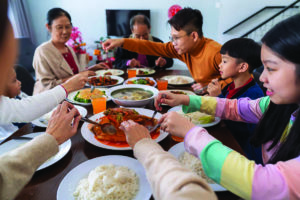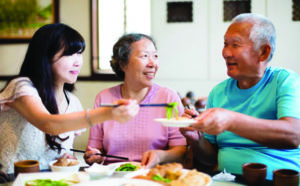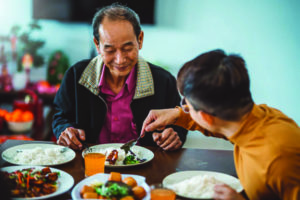 Here in Hawai‘i, the idea of multiple generations sharing meals together under one roof isn’t reserved for just the holidays. Hawai‘i has the highest percentage of multigenerational households in the country, with nearly 8 percent of households statewide classified as multigenerational — at least three generations living under one roof. This household structure represents one of the most beautiful things about Hawai‘i. It embodies the word ‘ohana and exemplifies the concept of an extended family. The people within it are bound by a genuine sense of mālama, kokua and kuleana. Especially during the holidays, compassion, loyalty and aloha radiate throughout the home.
Here in Hawai‘i, the idea of multiple generations sharing meals together under one roof isn’t reserved for just the holidays. Hawai‘i has the highest percentage of multigenerational households in the country, with nearly 8 percent of households statewide classified as multigenerational — at least three generations living under one roof. This household structure represents one of the most beautiful things about Hawai‘i. It embodies the word ‘ohana and exemplifies the concept of an extended family. The people within it are bound by a genuine sense of mālama, kokua and kuleana. Especially during the holidays, compassion, loyalty and aloha radiate throughout the home.
While tradition plays a significant role for families living together, the decision can’t be entirely linked to cultural sensibilities. For a lot of families, it’s a necessity due to the state’s high cost of living — the highest in the country. The pandemic has only exacerbated the lack of affordable housing. In order to make rent, many local families have no choice but to pool their incomes just to keep a roof over their heads — and more obstacles abound — obstacles like hunger.
But food insecurity and hunger don’t affect everyone in the household equally. Keiki and kūpuna are especially vulnerable. In these extraordinarily trying times, as parents often work multiple jobs to provide extra support, kūpuna may try to ensure food security for their grandchildren by foregoing their own needs. Therefore grandparents in multigenerational households can experience hunger at more than twice the rate of those in homes with no grandchildren. Through their own sacrifice, members of a household in Hawai‘i never lose sight of what it means to take care of one another.
But to help ensure every member of the household has the nourishment they need, Hawai‘i Foodbank offers special nutritional support through programs such as Food 4 Keiki, ‘Ohana Produce Plus, the Senior Food Box Program, and new initiatives like the Seniors Farmers’ Market Nutrition Program.
Hawai‘i Foodbank works closely with its network of more than 200 food partner agencies to provide food for families affected by the pandemic while continuing to provide assistance to those who were already struggling with hunger.
No longer associated with a stigma, these free resources provide an akamai strategy for kūpuna and their ‘ohana. It is simply a sign of the times for many seniors and their families.
Hunger deprives our keiki of more than just food. The fact is, a child’s chance for a bright tomorrow starts with getting enough nutritious food to eat today.
Ensuring our keiki receive the nutrition they need to excel in school relieves the pressure on kūpuna who sacrificed their own needs. The Food 4 Keiki School Pantry Program serves as a critical food resource for young students, their siblings and their families. The school pantries provide after-school snacks for young students, as well as additional family food bags to take home. Bags are filled with canned proteins, canned meals, dry goods, snacks and more. For pantry times and locations, visit www.hawaiifoodbank.org/keiki.
For more information on Food 4 Keiki and its programs, or to start one in your area, contact Marielle Terbio, director of community engagement and strategic initiatives, at marielle@hawaiifoodbank.org or 808-954-7869.
‘OHANA PRODUCE PLUS
‘Ohana Produce Plus is a mass, mobile food distribution program that enables Hawai‘i Foodbank to bring food directly into the communities where it is needed most. ‘Ohana Produce Plus provides hungry keiki, kūpuna, families and individuals greater access to fresh fruits and vegetables plus other supplementary food items.
For more than 20 years, the program has distributed millions of pounds of fresh produce, assorted dry goods and non-perishable food items to underserved communities — all at no cost to its recipients. Participants in this program include families with low income, individuals with disabilities, the homeless, working poor and more. For many people, ‘Ohana Produce Plus is their only source of fresh fruits and vegetables.
Go to “Distribution Times and Locations” at www.hawaiifoodbank.org/ohana to find a location near you. It is recommended that potential beneficiaries of this program call in advance to confirm service hours and requirements.
This program provides a monthly box of quality USDA food to low-income kūpuna in Hawai‘i.
For participating kūpuna, the Commodity Supplemental Food Program (CSFP) provides more than just food and nourishment. It also helps to combat the poor health conditions often found in kūpuna who are at risk of hunger and experiencing food insecurity. CSFP helps vulnerable kūpuna from having to choose between food and other basic needs. The food in each Senior Food Box can play an important role in combatting the health consequences of senior hunger, and ultimately, can help kūpuna avoid costly hospitalizations and nursing home placements.
Senior Food Boxes are specifically designed to supplement needed sources of nutrients typically lacking in participants’ diets. Boxes may include cereal, grains, dry beans, rice and a variety of canned fruits and vegetables and shelf-stable foods.
Participants must be at least 60 years of age. Each applicant must self-declare that their household income is at or below 130 percent of the US Federal Poverty Income Guidelines for the State of Hawai‘i. Applicants must reside in the service area to which they are applying for. Find other eligibility requirements and distribution locations, and download the application at hawaiifoodbank.org/csfp. Mail it to: Hawai‘i Foodbank, 2611 Kilihau St., Honolulu, HI 96819.
SENIORS FARMERS’ MARKET NUTRITION PROGRAM
The Seniors Farmers’ Market Nutrition Program (SFMNP) is designed to provide low-income kūpuna with access to locally-grown fruits, vegetables, honey and herbs.
Every year, Hawai‘i Foodbank partners with the State of Hawai‘i Office of Community Services and the US Department of Agriculture, Food and Nutrition Service to organize the Senior Farmers’ Market Nutrition Program. Hawai‘i’s SFMNP offers eligible seniors $50 worth of coupons (10 coupons valued at $5 each) to obtain eligible foods without charge from participating farmers, farmers’ markets and roadside stands that have been approved to accept SFMNP coupons. Through SFMNP, kūpuna are provided with nutritious foods as well as education to emphasize the relationship of proper nutrition to good health.
Find other eligibility requirements and locations, and download the application at hawaiifoodbank.org/sfmnp. Mail it to: Hawai‘i Foodbank, 2611 Kilihau St., Honolulu, HI 96819.
HELP NOURISH EVERY MEMBER OF OUR ‘OHANA
As we look toward the holiday season and 2023, let’s join together to help families eat together and achieve long-term food security and address the nutritional needs of each generation. Donate today at https://hawaiifoodbank.org/donate. Volunteer at volunteer@hawaiifoodbank.org. Let’s help ensure that no one in the house goes hungry.
HAWAI‘I FOODBANK, O‘AHU & KAUA‘I
2611 Kilihau St., Honolulu, HI 96819
808-836-3600 | hawaiifoodbank.org
THE FOOD BASKET, HAWAI‘I ISLAND
40 Holomua St., Hilo, HI 96720
808-933-6030 | hawaiifoodbasket.org
MAUI FOOD BANK, MAUI COUNTY
760 Kolu Street, Wailuku, HI 96793
808-243-9500 | mauifoodbank.org




Leave a Reply